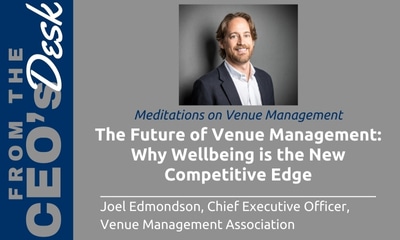By Joel Edmondson, VMA CEO
In the fast-paced, high-pressure world of venue management, the focus has traditionally been on logistics, efficiency, and revenue generation. However, leading researchers in workplace psychology, Kevin Hesketh and Cary Cooper, argue in their book Wellbeing at Work that sustainable success in any industry depends on the mental and physical health of its workforce. As the venue management industry navigates post-pandemic challenges, talent shortages, and evolving audience expectations, prioritising employee wellbeing is no longer a luxury—it’s a strategic necessity.
-
-
Increased absenteeism and presenteeism (being physically present but mentally disengaged)
-
Higher staff turnover rates, leading to recruitment and training costs
-
Reduced productivity and performance
-
A decline in innovation and creativity
-
For venues, where teamwork and operational excellence are essential, these costs can translate into lower service quality and, ultimately, financial losses.
Hesketh and Cooper propose that wellbeing should not be treated as an afterthought or a perk but as a central business strategy. The most successful organisations integrate wellbeing into their culture, policies, and leadership approaches. For venue managers, this could mean:
2. Mental Health Support – Offering employee assistance programs (EAPs), mindfulness training, or on-site counselling can provide staff with the tools to manage stress effectively.
3. Workload Management – Encouraging realistic scheduling, adequate breaks, and job rotation can help prevent burnout in high-pressure roles.
4. Leadership Development – Training managers to recognise and support staff wellbeing creates a culture where employees feel valued and heard.
5. Physical Wellbeing Initiatives – Providing healthy food options, ergonomic workspaces, and access to fitness programs can contribute to overall staff health.
The research presented in Wellbeing at Work reinforces that organisations with a strong wellbeing culture outperform their competitors. Employees who feel supported are more engaged, creative, and resilient in the face of challenges. In the venue industry, where customer experience is paramount, happy and healthy staff translate into better service, higher client satisfaction, and stronger brand reputation.
The VMA has long championed best practices in venue management, and it’s time to expand that focus to include wellbeing. As an industry, we must ask ourselves: How can we create workplaces where staff thrive, not just survive? By adopting a wellbeing-first approach, venue managers can foster a resilient, motivated workforce prepared to tackle the evolving demands of the industry.




